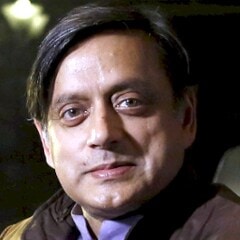Tharoor Line | Discarding diversity will fail the idea of India

Mail This Article
Another Independence Day is upon us. As we celebrate our 75th birthday, it is again time to reflect on what kind of country we are.
India, I have long argued, is more than the sum of its contradictions. It is a country held together, in the words of Nehru, "by strong but invisible threads ... a myth and an idea, a dream and a vision, and yet very real and present and pervasive". That nebulous quality is what the analyst of Indian nationalism is ultimately left with; to borrow a phrase from Amartya Sen, it is an idea — the idea of India.
But what is that idea? Jawaharlal Nehru articulated it as pluralism vindicated by history, seeing the country as an "ancient palimpsest" on which successive rulers and subjects had inscribed their visions without erasing what had been asserted previously. A generation of secular nationalists echoed him, making "unity in diversity" the most hallowed of independent India's self-defining slogans. Their secularism is questioned today by a new ruling dispensation that has sought to redefine nationalism in more sectarian terms.
How did India preserve and protect a viable idea of itself in the course of the last 75 years, while it grew from 370 million people to 1.4 billion, reorganised its State structures, and sought to defend itself from internal and external dangers, all the while remaining democratic? I have tried to answer this question at length in my books. Certainly the accomplishment is extraordinary, and worthy of celebration.
Amid India's myriad problems, it is democracy that has given Indians of every imaginable caste, creed, culture, and cause the chance to break free of their lot. There is social oppression and caste tyranny, particularly in rural India, but Indian democracy offers the victims a means of escape, and often — thanks to the determination with which the poor and oppressed exercise their franchise — of triumph.
In the seven and a half decades since Independence, democracy has failed to create a single political community. Instead, we have become more conscious than ever of what divides us: religion, region, caste, language, ethnicity.

Caste, which Nehru and his ilk abhorred and believed would disappear from the social matrix of modern India, has not merely survived and thrived, but has become an instrument for highly effective political mobilisation. In many States, caste determines educational opportunities, job prospects, and governmental promotions; all too often, people say you cannot go forward unless you're a "backward".
Ironically, a distinctive feature of the Nehruvian legacy was its visionary rejection of India's assorted bigotries and particularisms. Today his secularism is sneered at. Whether through elections or quotas, political mobilisation in contemporary India has asserted the power of old identities, habits, faiths, and prejudices.
What makes India, then, a nation?
When an Italian nation was created in the second half of the 19th century out of a mosaic of principalities and statelets, one Italian nationalist wrote: "We have created Italy. Now all we need to do is to create Italians." It is striking that, a few decades later, no Indian nationalist succumbed to the temptation to express a similar thought. The prime exponent of modern Indian nationalism, Nehru, believed that India and Indians had existed for millennia before he articulated their political aspirations in the 20th century.
Yet Indian nationalism was not based on any of the conventional indices of national identity. Not language, since our constitution now recognises 23 official languages, and as many as 35 languages spoken by more than a million people each. Not ethnicity, since the "Indian" accommodates a diversity of racial types in which many Indians (Punjabis and Bengalis, in particular) have more ethnically in common with foreigners than with their other compatriots. Not religion, since India is a secular pluralist state that is home to every religion known to mankind, with the possible exception of Shintoism. Not geography, since the natural geography of the subcontinent - framed by the mountains and the sea - was hacked by the partition of 1947. And not even territory, since, by law, anyone with one grandparent born in pre-partition India -- outside the territorial boundaries of today's state -- is eligible for citizenship. Indian nationalism has therefore always been the nationalism of an idea.
It is the idea of a land emerging from an ancient civilisation, united by a shared history, sustained by pluralist democracy and civic nationalism. India's democracy imposes no narrow conformities on its citizens. The whole point of Indian pluralism is you can be many things and one thing: you can be a good Muslim, a good Keralite and a good Indian all at once. If America is famously a “melting-pot”, then to me India is a thali, a selection of sumptuous dishes in different bowls. Each tastes different, and does not necessarily mix with the next, but they belong together on the same plate, and they complement each other in making the meal a satisfying repast.
India's founding fathers wrote a constitution for their dreams; we have given passports to their ideals. Today these ideals are challenged by the majoritarian triumphalism of those in power, who prefer to discard diversity and pluralism as relics of the past and to affirm instead an alternative idea of India as a “Hindu Rashtra”. But a divided India – the India of January 30, 1948 – can never fulfil the promise of a united India – the India of August 15, 1947. We must remain faithful to our founding values of the 20th century if we are to conquer the 21st.


